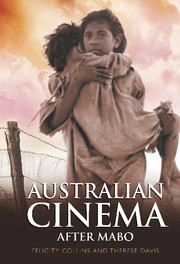Book contents
- Frontmatter
- Contents
- Acknowledgments
- Part 1 Australian Cinema and the History Wars
- 1 Backtracking after Mabo
- 2 Home and Abroad in Moulin Rouge, The Dish and Lantana
- 3 Elites and Battlers in Australian Rules and Walking on Water
- 4 Mediating Memory in Mabo – Life of an Island Man
- Part 2 Landscape and Belonging after Mabo
- Part 3 Trauma, Grief and Coming of Age
- Bibliography
- Index
2 - Home and Abroad in Moulin Rouge, The Dish and Lantana
Published online by Cambridge University Press: 31 January 2011
- Frontmatter
- Contents
- Acknowledgments
- Part 1 Australian Cinema and the History Wars
- 1 Backtracking after Mabo
- 2 Home and Abroad in Moulin Rouge, The Dish and Lantana
- 3 Elites and Battlers in Australian Rules and Walking on Water
- 4 Mediating Memory in Mabo – Life of an Island Man
- Part 2 Landscape and Belonging after Mabo
- Part 3 Trauma, Grief and Coming of Age
- Bibliography
- Index
Summary
When Russell Crowe became the inaugural winner of the Global Achievement Award at the nationally televised 2001 Australian Film Institute (AFI) Awards, he ended his acceptance speech with the provocative words, ‘God bless America’. It was not hard to imagine the assembled film and television industry catching its collective breath. Only two years before, in 1999, the AFI Awards had provided a public platform for the industry's attack on the High Court's decision that New Zealand programs would henceforth qualify as Australian content when broadcast on free-to-air commercial television. In 2003 the AFI Awards ceremony once again became a public forum for the industry's vociferous attack on the bilateral trade agreement being negotiated with the United States. For a national feature film industry struggling to extract more than 5–7 per cent of the nation's annual box office revenue from Australian cinema-goers, Crowe's words must have felt like a rude betrayal of the home-grown industry that had nurtured his talent. So it is not hard to imagine a collective sigh of relief going through the auditorium when Crowe added, after a perfectly timed pause, ‘And thank God for Australia’. In 2002, accepting the award for his leading role in The Tracker, David Gulpilil, again with impeccable timing, responded to the ovation with a laid-back one-liner, ‘Thanks. I deserve this.’ Unlike Crowe, Gulpilil did not get to deliver a preamble or elaborate on his punchline, at least to the television viewers, who were immediately diverted to a commercial break.
- Type
- Chapter
- Information
- Australian Cinema After Mabo , pp. 22 - 40Publisher: Cambridge University PressPrint publication year: 2004



